When Laughter Speaks Louder Than Words
A story of a cosmic rebel and rascal without words, her tickle string, and the laughter that refuses to be silenced.
When Libby was born at one pound, resuscitated twice, intubated, and soundless in a semi-coma for six months, I never imagined laughter would become her superpower.
On March 6, I shared the Substack note below about Libby.
I’ve been quiet since—not because I’ve disappeared, but because I’ve been busy in a complicated yet good way.
After years of advocating for Libby, the funding for her to remain cared for at home has just doubled. I’m tasked with creating a spending plan based on specific criteria tailored to her needs and long-term goals.
It’s exciting and overwhelming. I’m not a natural administrator—but I am determined to make sure the people who support her are well cared for, too. Everyone receives a raise to meet the current economy. We’re creating a more accessible environment for Libby in our home—and for her inclusion in the community.
The post that received 17,054 clicks, 2,843 likes, 70 new subscribers, and 285 comments filled with kindness, inspiration, and curiosity to know more about her.
My beautiful Libby Joy was born at one pound, three months premature. She has significant disabilities and requires full-time assistance for everything. She doesn’t have language, but I understand her sounds and spontaneous, contagious laughter.
Most nights, I sleep in a loft above her so I can attend to her quickly if she needs me. Sometimes, she is very loud—grinding her teeth, snorting, making deep, guttural noises. Sometimes, it sounds like she is drowning in her saliva.
Last night was a long night.
I was in a deep sleep at 8 AM when I heard—
"Maa thor."
Yes—mother.
I sat up, buzzing, listening, tearing.
Again, she said,
"Maa thor."
Today, I will treat her with a favorite dessert, blueberry cream pie.”
October 21, 1996. A voice in my head, which hung like a caged bird, kept repeating over and over:
‘This isn’t happening. You’re dreaming. This is someone else’s life.’
Several doctors spoke to me, a language I didn’t know or want to hear. Nobody made sense.
The steady ping-ping of heart rate monitors. The rising whoosh of oxygen machines. The sudden shrill of alarms.
‘Go. Run. This isn’t your life.’
Nurses moved quickly. Shoes clicking. IV bags hissing. Ventilators sighing. People whispering. Others sobbing.
I was alone, my breath borrowed. My body collapsed in a chair reserved for grief. Dr. Sunshine stopped before me,
“You can hold her now.”
He was referring to the tiny, bruised neonate attached to too many tubes and wires to count, tucked into hospital blankets beneath a layer of bubble wrap.
“Who, me?” I gasped. “I might break her.”
Earlier that day, my friend Leni had sat with me. She pulled out her driver’s license to measure Libby. She was only twice as long as her card—7.6 inches.
I couldn’t feel my legs. A nurse offered to bring her to my chest, wires and all. She wore a doll-sized diaper. She whispered words that didn’t quite land, as she slowly and tenderly placed her onto my bare chest.
Libby fit between my leaking breasts. Her mouselike fingernails scratched like pins toward my nipple. I panicked, afraid my nipple might suffocate her. But she insisted—her body, her instinct—and began slow, labored sucking.
“She probably won’t have use of her legs, but she will be all right.”
Said Dr. Sunshine one day, as he stooped a little over us in our chair. A man about fifty, of medium height and rather slender build; he wore eyeglasses and a stethoscope in his white jacket pocket.
Legs. Who needs legs? Said the voice, taking on a bewildering sarcastic tone.
We continued like this for three and a half months in the NICU—where science and fragility coexist—day into night, like a vigil, until she reached three and a half pounds, the required weight to come home.
Once home, the voices continued, peaking at six months when the sedation wore off.
Libby woke from a semi-coma state—unhinged, unwrapped.
Her nervous system lacked sufficient myelin sheath to protect it, was exposed, unable to filter surround sound—traffic, dogs, cooking, voices, the wind… Sounds that might soothe a typical nervous system scorched hers like a raw steak thrown into a fire-hot skillet.
She seized repeatedly, projectile vomited, cried, and screamed endlessly. I was beside myself, with her twin and my toddler to care for. Her father wanted to send her back, to institutionalize her. Soon, I was on my own.
I carried her everywhere in a baby sling. As long as she was wrapped tight—bouncing, rocking, moving—she would settle and digest my milk. This went on for two and a half years.
One dark, lonely night, newly separated, done in, spent, whipped to the gills—tittering on the edge, I nearly folded, ending it for both of us. Thankfully, we were pushed back from a rocky cliff that hung over the cold sea, transported by a great spirit that ushered us home like a cherishing mother.
That night, we slept for four hours together in the recliner rocking chair. It was the first of uninterrupted sleep since we came home, the first glow of Libby’s angelic smile, and the first felt sense of unified joy to be alive for this one precious life.
Our labor to accept and love our unscripted, strange life was fierce. Our efforts to assimilate and orient to life as a single mom with twins and disabilities would fill volumes. I gave it my best narrative in Edge of Grace: Fierce Awakenings to Love. You can support the full cast of characters by celebrating our life-affirming journey, it’s our tenth anniversary.
Twenty-eight years of juggling a household, obtaining resources, neurological acupuncture to eliminate her seizures, intensive developmental movement programs, hyperbaric oxygen therapy, and travel to Canada and Pennsylvania for training in Conductive Education and Holistic Curative Care have enhanced our life with people, possibilities, and learning we never could have imagined.
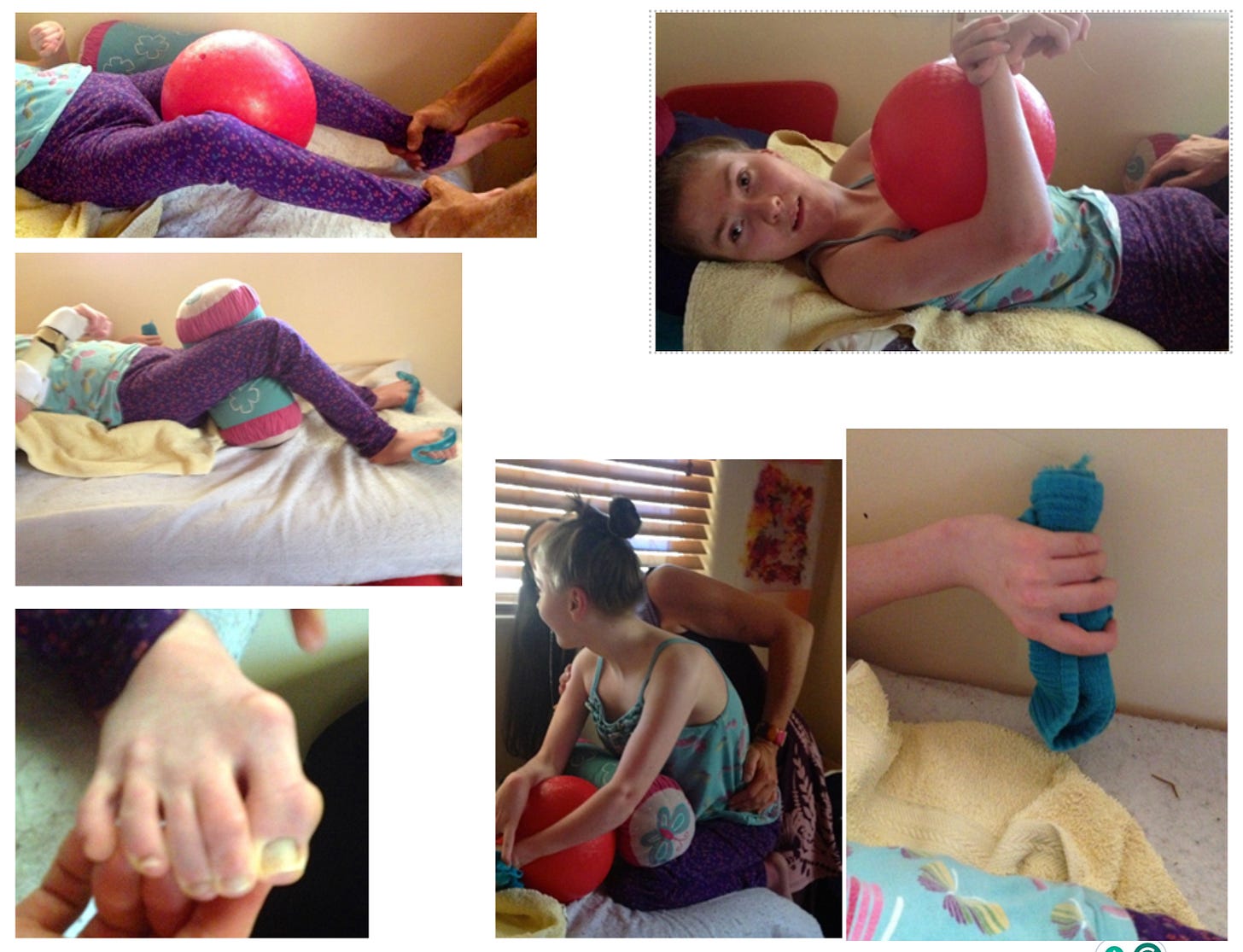
Libby is a true heroine.
Her greatest gift—the one that requires no effort, yet has gotten her in trouble at school and in movie theatres—is her explosive, contagious laughter.
When the world around her is sighing, frowning, rushing, pushing, not connecting—taking life far too seriously, Libby bursts into outrageous giggle fits… and she doesn’t stop until the world around her is laughing with her.
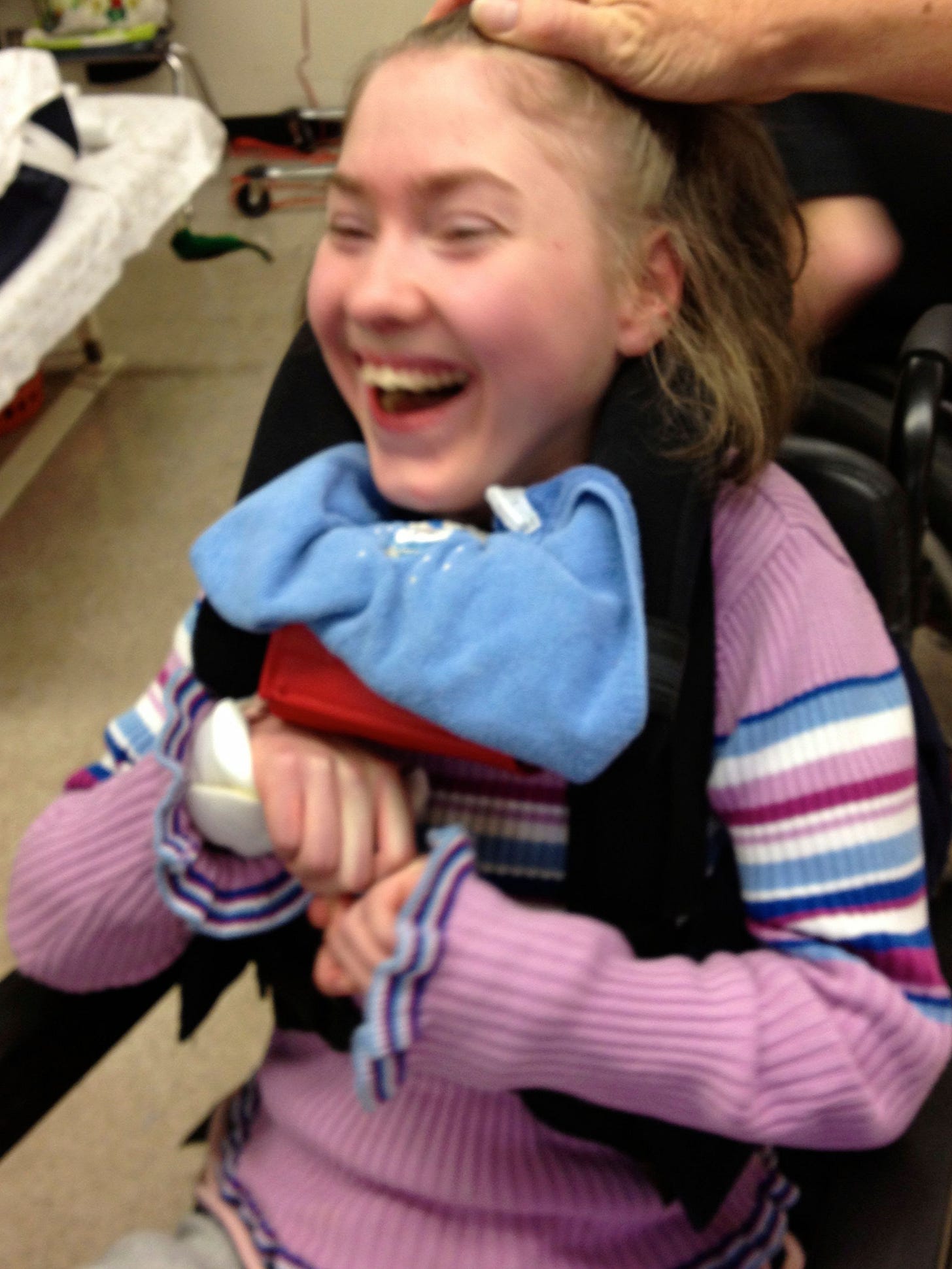
If Libby isn’t secured by straps, she nearly kicks herself out of her chair at suggestions of pudding, pie, Autumn, or going out to places like Garfield Park. Due to her brain injury, Libby is blind and highly sensitive; she recognizes people by the way their feet move across the floor, their tone of voice, or their unique scent. The fresh air and oxygen from the trees calm her nervous system, making her very still and curious. One summer day, I parked Libby’s wheelchair near a bench and sat down to enjoy the scene. A little girl in a blue dress with curly brown hair approached us, moving slowly with bright eyes.
“What’s the matter with her?” she whispered.
“This is Libby. You can talk to her,” I said, expecting her to dash to her mama like most little children. But she didn’t. Instead, she moved closer to Libby, took her hand, and said,
“Hi Libby, my name is Rosy. Do you want to play?”
Libby was quiet for a moment, absorbed inside, then kicked her legs as if to say ‘yes’, bubbling with delight. Children were playing on the swings and monkey bars. Rosy pushed Libby around the park as if they were touring the circus, Libby squealing with joy, Rosy steering like a ringmaster, newly connected friends lit up with wonder.
I wish I could report more magical days like this—when Libby isn’t sitting in the margins, alone. These days, she’s rarely upset—unless she senses she’s being left out. At home, when Autumn, Abby, and I can’t take her with us because a place isn’t accessible, Libby feels the disconnect and lets us know—with sharp guttural cries that pierce the room, ‘I’m coming!’ Like everyone, her social nervous system is hungry for belonging—an essential ingredient for well-being.
We all need a Rosy—someone who looks beyond difference, beyond ideas of right or wrong—and recognizes the great joy in simply saying ‘hello,’ joining in playful companionship.
Libby and I regularly play the tickle string game. We’re well practiced. All I have to do is say, “Where is that tickle string?” and she’s a goner, undone, in the best way.
My fingers gently creep up her back. “Is this it? I think I’ve got it… Wait—did I lose it? I’m going to find it again. Where is that tickle string?”
It’s never long before the whole house hears Libby’s delight.
She squeals like a pig in mud—joyful, wild, and fully alive—because she knows the tickle is carbonated holiness.
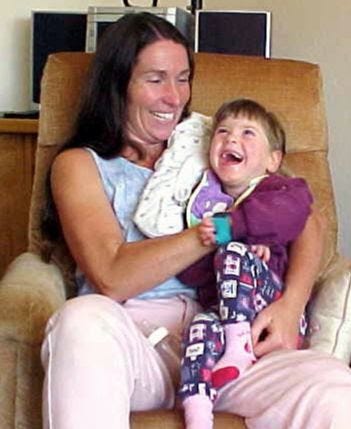
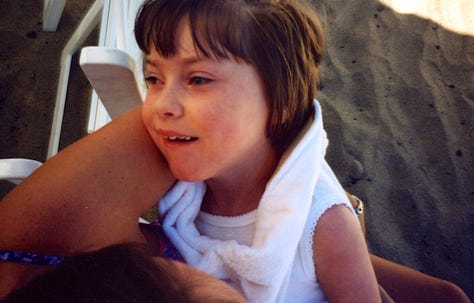
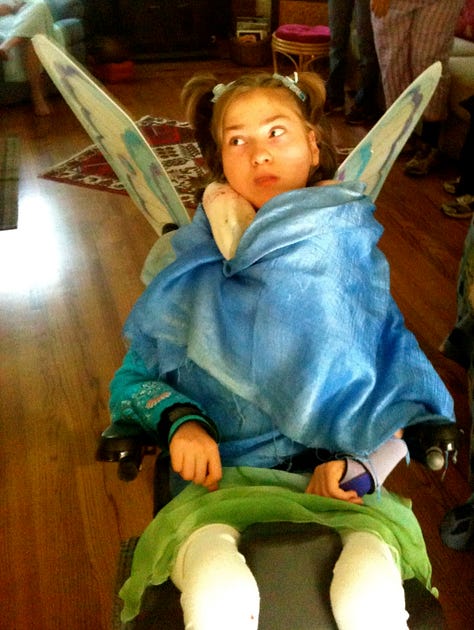
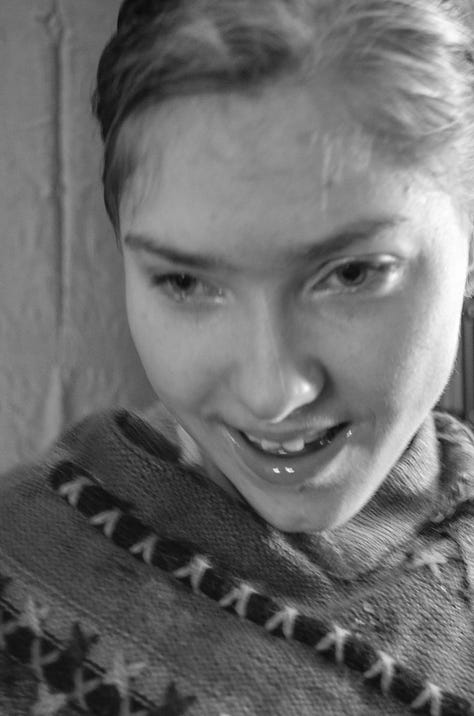
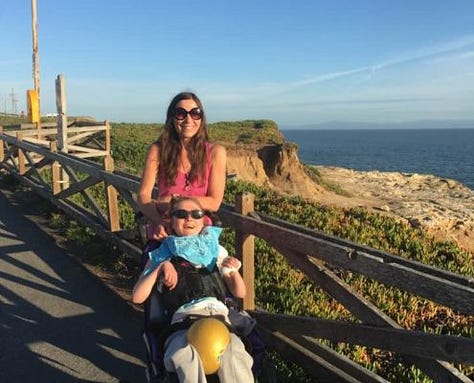
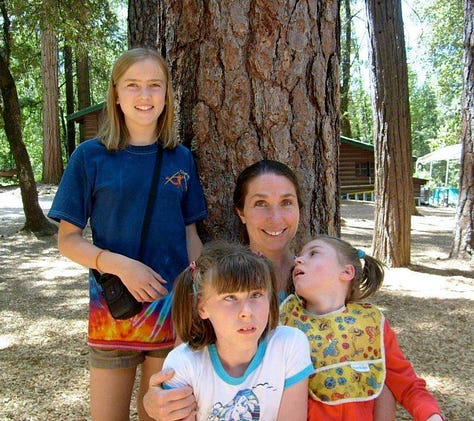
Dear Friend,
Thank you for reading this vulnerable piece. Libby and I appreciate you being here. 💛
I would love to read your comments to Libby. If it pleases you, share this post with a friend and tell us:
✨ What’s your ‘tickle string’?
🌿 What lights up your day?
🔥 What helps you relax out of a noisy world on fire?
💫 What act of kindness inspired you to keep going?
We’d love to hear from you. Your words mean more than you imagine.
Love,
Prajna O’Hara aka The Salty Crone
🌿 P.S. An Invitation from My Heart to Yours
There are countless terrific people and resources I’ve met along the way—guides who helped me navigate the unexpected, the hard, the messy, the beautiful … and taught me to celebrate imperfection rather than normalize unbidden harm.
My greatest passion is working with the plant spirits of two Indigenous cultures that have informed, blessed, and transformed my path.
I would be remiss not to share this sacred resource with you.
If you feel called to embody more of your feminine soul, to stand fully in your freedom, and to cherish this one precious life ✨ summer and fall retreats are now booking.
You can read more details and reflections from others who’ve joined me here.
“I came one way, I left another. This was the single most important journey of my spiritual path. For the first time—I belong.” —


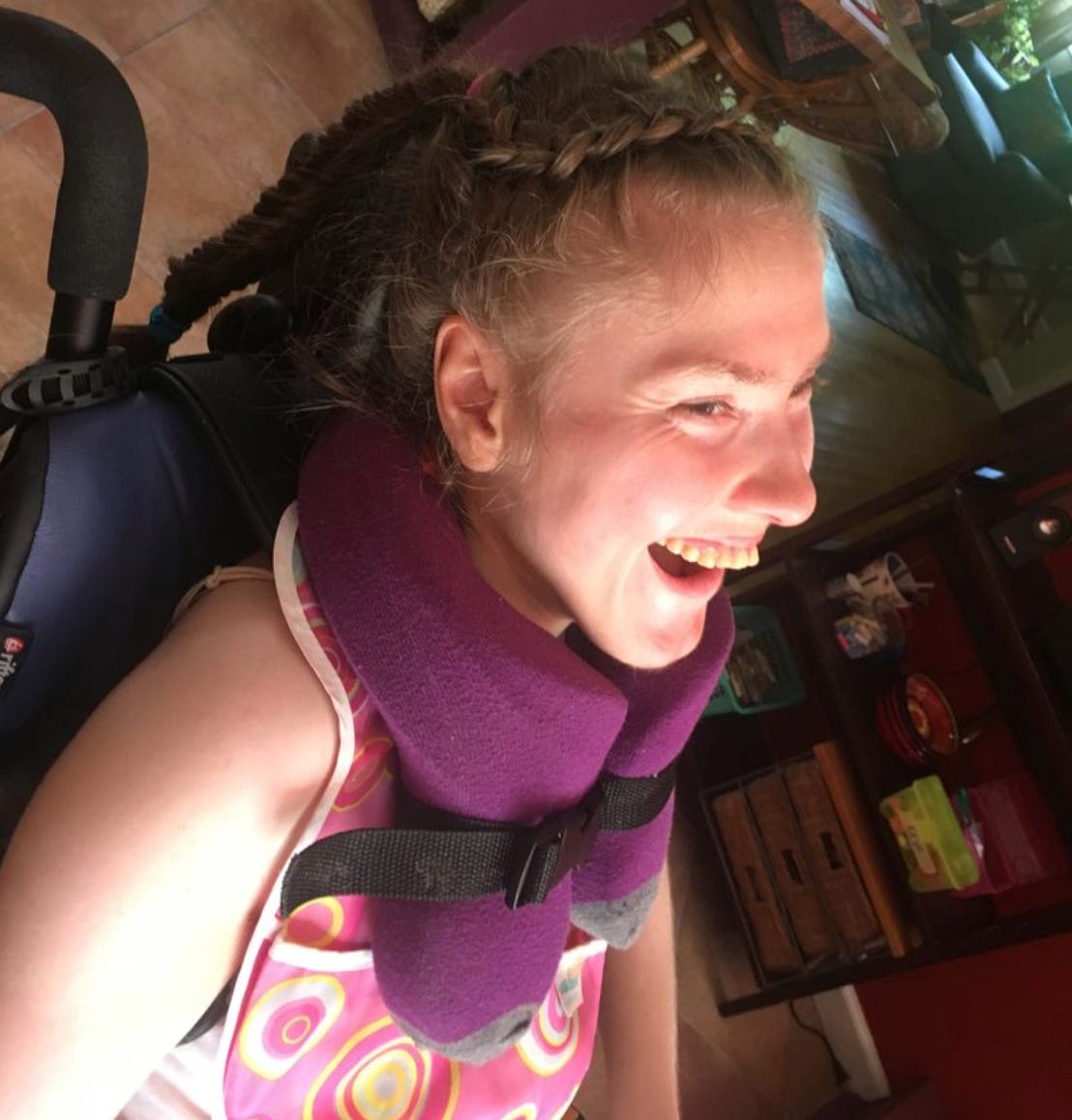

Libby is clearly of your heart and your spirit and your soul. How uplifting, courageous, and inspiring. And how it makes one, makes me think, of the strength that can be found, when you have to. What a journey.
Dear Libby. You are gorgeous. I love your explosive laugh that doesn’t stop until people join you. Let it get you into good trouble. You give me courage and hope for this world. It sounds like things are going well for you, and that makes my heart happy.